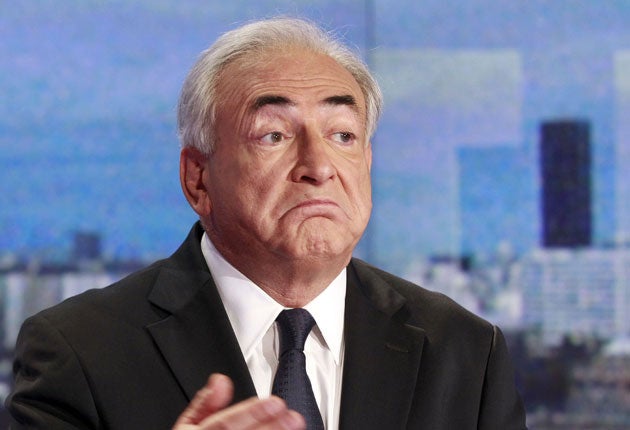Dominique Strauss-Kahn says sorry for 'moral failing' in TV interview as he looks to rebuild career

Your support helps us to tell the story
From reproductive rights to climate change to Big Tech, The Independent is on the ground when the story is developing. Whether it's investigating the financials of Elon Musk's pro-Trump PAC or producing our latest documentary, 'The A Word', which shines a light on the American women fighting for reproductive rights, we know how important it is to parse out the facts from the messaging.
At such a critical moment in US history, we need reporters on the ground. Your donation allows us to keep sending journalists to speak to both sides of the story.
The Independent is trusted by Americans across the entire political spectrum. And unlike many other quality news outlets, we choose not to lock Americans out of our reporting and analysis with paywalls. We believe quality journalism should be available to everyone, paid for by those who can afford it.
Your support makes all the difference.Dominique Strauss-Kahn attempted to restore his shattered reputation on French television news last night despite a feminist demonstration and a poll suggesting that he had little future in French politics.
The former head of the International Monetary Fund, 62, was making his first lengthy public comment since his arrest in New York in May on charges of attempted rape that were later dropped.
He was expected to offer some sort of apology or regrets to the French people through his interviewer, Claire Chazal – a close friend of his wife's – but refused to discuss in detail what happened between him and the chambermaid Nafissatou Diallo in suite 2806 at the Manhattan Sofitel.
His 20-minute appearance on the evening news bulletin of TF1 was itself the source of new controversy. Two French feminist groups demonstrated outside the TF1 studios, complaining that the former French Finance minister had been given what amounted to a friendly platform despite facing continuing law cases for "sexual aggression" in both the US and France.
Ms Diallo's lawyers, who are pursuing a civil case against Mr Strauss-Kahn, said the Socialist politician should be forced, finally, to give his own version of what happened in the nine minutes that he spent with the chamber-maid on 14 May.
DSK refused to discuss the incident in detail with American investigators, invoking the right to silence granted to suspects under American law. Friends said that he was under instructions from his lawyers in New York to make only the most general comments about his encounter with Ms Diallo, which, they insist, was consensual.
In a further blow to Mr Strauss-Kahn's reputation, it emerged yesterday that he had admitted to French police that he made sexual "advances" to a young French writer, Tristane Banon, during an interview in a Paris flat in 2004. DSK told French investigators that he tried to kiss Ms Banon – who was then 27 and a close friend of his daughter's – but had stopped when she objected. Ms Banon, who made no formal complaint at the time, says that Mr Strauss-Kahn wrestled her to the floor and attempted to undress her.
She accuses him of attempted rape. DSK's lawyers had previously insisted that the incident was "imaginary".
By admitting an "advance", Mr Strauss-Kahn has conceded, in effect, that circumstantial evidence exists that he did have a sexual encounter with Ms Banon. His lawyers hope that prosecutors will decide that he was guilty of, at the most, sexual assault. Under French law, a sexual assault case must be brought within three years, compared with 10 years for attempted rape.
Subscribe to Independent Premium to bookmark this article
Want to bookmark your favourite articles and stories to read or reference later? Start your Independent Premium subscription today.
Join our commenting forum
Join thought-provoking conversations, follow other Independent readers and see their replies
Comments